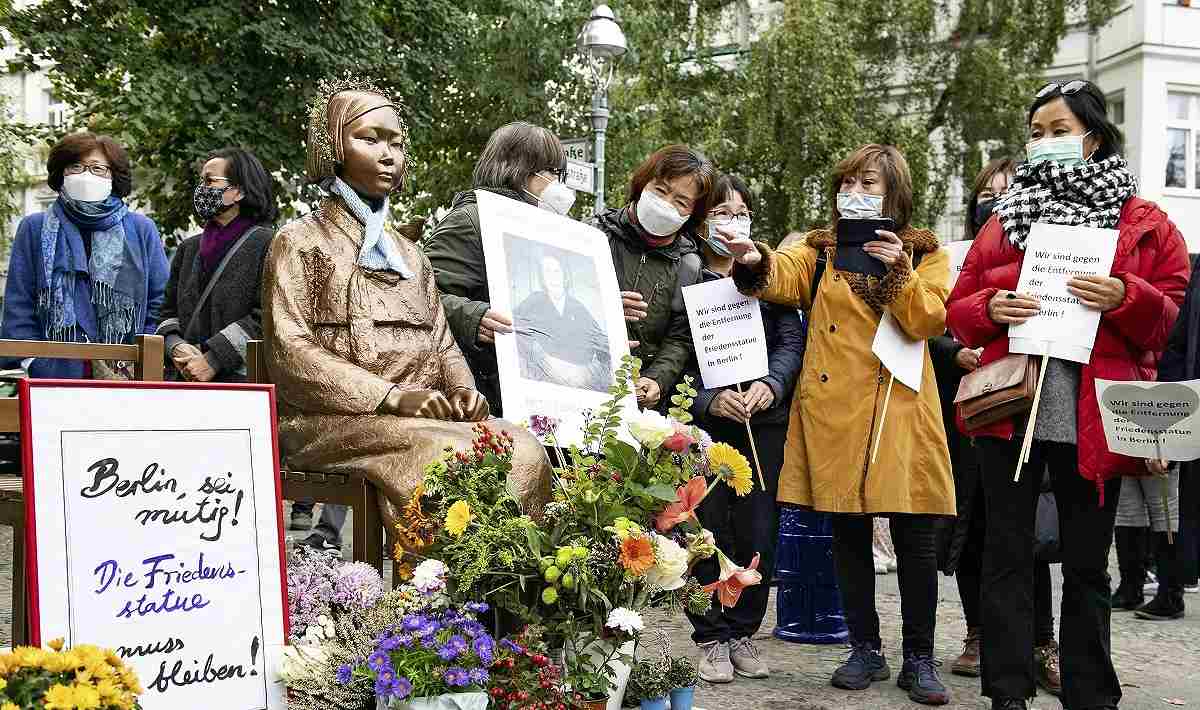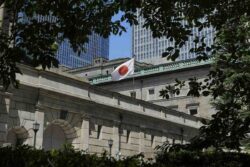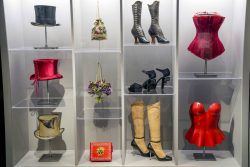
Representatives of a Korean association in Germany protest against the decision to remove a statue representing comfort women in Moabit in the Mitte district of Berlin on Oct. 13.
10:16 JST, December 14, 2020
The removal of a statue symbolizing comfort women set up in the Mitte borough of central Berlin will be difficult now that the local government has decided to keep it. German public opinion tends to agree with South Korea’s position, making it tough to solve the problem.
■ On district-owned land
Korea Verband (Korean association), a civic group mainly consisting of South Korean residents in Germany, erected the statue on land owned by Mitte on Sept. 28 after receiving permission. The inscription on the monument ignores historical facts and unilaterally claims that “the Japanese military abducted girls and women and made them sex slaves.” The Japanese Embassy in Berlin has urged the removal of the statue, explaining the Japanese government’s efforts to resolve the comfort women issue.
The mayor of Mitte understood Japan’s argument and asked the South Korean association to remove the statue on Oct. 8. According to an announcement made by the district, whether or not to set up the statue was discussed from the viewpoint of it being “a statue of peace that opposes wartime sexual violence against women” but in fact, the theme of the statue turned out to be only acts by the Japanese military during World War II. The borough said in an explanation of why it asked the association to remove the statue that it cannot side with one country over another, especially when the conflict is about their history, because the district is home to people from more than 100 countries.

A statue commemorating so-called comfort women is displayed at a residential area in central Berlin, on Oct. 9.
■ Pressure to keep statue
However, the association objected to the removal and appealed to the administrative court, with 200 people rallying for the cause in Berlin. About 2,000 people expressed their agreement with an open letter from the association, which asked the borough to keep the statue. Upon receiving the letter, the borough withdrew the removal request and held talks with the association on Oct. 13.
On Dec. 1, the borough assembly adopted a resolution submitted by the Green Party demanding that the statue be kept. The resolution was voted on by 29 of the 55 assembly members. It was approved by 24 members from the Green Party, the Left and the Social Democratic Party and opposed by five members from the Christian Democratic Union and the Free Democratic Party. The mayor said he would allow the statue to stay at the site for about a year.
There were moves to set up similar statues in Freiburg and Bonn, but they did not come to fruition due to lobbying by the local Japanese consulates. On the other hand, statues were installed in Wiesent, a city in southeastern Germany, and Frankfurt.
■ One-sided view
Germany is the only European country that has such statues. Diplomats say it is due to long-term lobbying by South Korean resident groups and to the fact that there is a tendency in Germany to accept claims made by South Korea.
German media mostly carry one-sided reports about the issue. For example, the Tageszeitung newspaper wrote: “The Japanese military abducted at least 20,000 women from occupied land and took them to military brothels during the war” and, “The actions of Japan’s right-wing conservative government do not help to solve or prevent wartime sexual violence and are seen as promoting denial and downplaying.”
Many German researchers of Japan are critical of its postwar management. Prof. Steffi Richter of Leipzig University, who studies the new right wing and historical revisionism in Japan, said, “These reactionary networks are involved in the attempt to remove the statues.”
A diplomatic source said: “Germans tend to think that they did a good job in sorting out the Nazis after the war and that Japan was inadequate. South Korean resident groups are taking advantage of this German pride.”
Leftist political parties, in particular, have a strong tendency to disregard Japan’s efforts since the war and accept without question China and South Korea’s assertion that “Japan has not apologized or compensated.” One leftist statement asserted that, “Comfort women were abducted and enslaved by the Japanese military,” adding, “The statue was set up by the Korean association as a message against sexual violence.” The association met with leftist members of the borough assembly individually and lobbied them.
■ Patient explanations
It cannot be denied that the Japanese Embassy in Berlin mainly lobbied the central and state governments of Germany but it did not do enough to build ties with municipal governments, including borough governments. After the statue was set up, the embassy stepped up its efforts to reach out to those involved. Some of them, mainly conservative borough assembly members, have shown understanding, while some others refused to even hear explanations.
The decision to retract the plan for a statue in Freiburg is said to be largely due to lobbying from Japanese residents in the city and from Matsuyama, the sister city of Freiburg. A diplomatic source said, “We need to have them understand that this could hamper grassroots exchanges and damage Japan’s perception of Germany.”
The Dec. 1 assembly resolution also calls on the borough to hold discussions with Korea Verband, with the assembly’s involvement, on the issue of permanently establishing the statue.
The embassy plans to continue patiently explaining Japan’s postwar efforts so that German people will have an accurate understanding of the issue, but it will inevitably take a long time to solve the problem.
"World" POPULAR ARTICLE
-

S. Korea’s Lee Eager to Enhance Ties with Japan More
-

Taiwan to Fully Lift Import Restrictions on Japanese Foods for First Time Since 2011 Fukushima Nuclear Accident
-

7,500 Buildings in Alexandria, Egypt, at Risk of Collapse Likely Due to Global Warming; International Countermeasures Becoming Urgent
-

S. Korean Lee Heads for U.S. to Meet Trump, Wrapping Up Trip to Japan
-

Modi Says India Will Work More Closely with Japan on Defense, in Interview with Yomiuri Shimbun
JN ACCESS RANKING
-

Japan’s Seafood Exports Still Hurting in Wake of Fukushima Incident, but Hopes Rising for Chinese Market
-

Japan’s Core Inflation Slows in July, Stays above BOJ Target
-

Japan in Prime Spot for Total Lunar Eclipse Early Monday Morning, 1st Visible from Country in Almost 3 Years
-

Japan, India Aim for More Than 500,000 People-to People Exchanges over Next 5 Years
-

S. Korea’s Lee Eager to Enhance Ties with Japan More





















